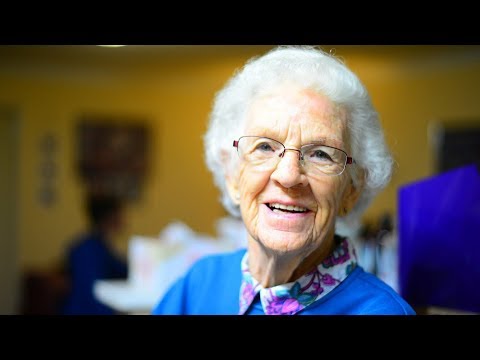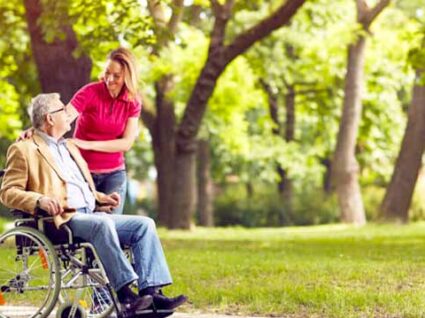Dementia Symptoms and Behaviors Common in Seniors

According to the Alzheimer’s Association, an estimated 5.8 million Americans age 65 and older are living with Alzheimer’s dementia. With such an impact, it’s important to recognize the early symptoms of Alzheimer’s dementia and how to plan for it.
Typically associated with the most common symptoms such as memory loss and forgetfulness, Alzheimer’s dementia can progress from mild cognitive impairment to severe cognitive impairment resulting in loss of language and motor skills.
Other dementia symptoms can vary. And, while seniors are most affected, it can and does affect adults of any age.
Most Common Dementia Symptoms
Similar to other health conditions, dementia affects people differently. Dementia symptoms can develop slowly and build progressively over time.
Early symptoms of dementia in seniors include:
- Short-term memory loss that disrupts daily life. An individual may forget recently learned information, important dates or events, ask the same questions repeatedly or need to rely on memory aids (i.e. calendar notes, electronic reminders or family members.) In addition, an individual may start putting everyday items in unusual places and are unable to trace their steps to find them again. This often leads to accusations of stealing.
- Often finding difficulty in finding the right words or phrasing. This could include an individual stopping in the middle of a conversation or having trouble naming a familiar object, such as “table” or “watch.”
- Visible changes in mood and attitude, such as unexplained outbursts of anger and crying.
- Confusion and difficulty completing routine tasks. This could include following cooking recipes or keeping track of bills.
- Changes to spatial relation processing abilities, resulting in accidents or difficulty with directions. For example, getting lost on the way to the grocery store and finding the way back home, issues with balance or trouble reading.
- Obsessive and repetitive behaviors tied to memory loss. This could include locking doors over and over again and washing hands excessively.
- Extreme difficulty with change or disruptions to normal patterns and routines, which can result in fear, stress and anxiety.
Normal Signs & Symptoms of Aging
It’s important to remember that less disruptive memory issues are part of the normal signs of aging. Normal aging refers to the common biological factors that occur in bodies as they grow older. The Alzheimer’s Association cites examples of normal age-related memory loss—an individual may:
- Sometimes forget names or appointments but remember them later.
- Make occasional and slight errors when managing finances.
- Occasionally need help when using technology, such as recording a television show.
- Become slightly confused about the day of the week but remember later.
- Have vision changes related to cataracts or other age-related eye function.
- Misplace things from time to time but are able to retrace their steps to find them.
- Occasionally making poor decisions, such as forgetting to change the oil in a car.
- Sometimes feel uninterested or tired in family or social gatherings.
- Feel slightly irritated when a routine is interrupted.
In some cases, seniors with dementia or Alzheimer’s disease may require more care than a spouse, child or other loved one can provide. In those cases, a doctor may recommend palliative care or other specialized medicine.
Causes & Risk Factors for Dementia

According to the Alzheimer’s Association, there are a number of factors that can potentially increase the risk of developing Alzheimer’s disease and dementia:
- Age. It is important to remember that these diseases are not a part of normal aging.
- Family history.
- Genetics.
- Race and ethnicity; Hispanic and African American adults are more likely to develop dementia and Alzheimer’s disease than their Caucasian counterparts.
Signs & Symptoms of Advanced Dementia

As dementia progresses, the symptoms of the disease start to have a larger impact on a person’s quality of life and well-being. It impacts their ability to perform everyday tasks and activities they once enjoyed.
Advanced dementia can also cause psychological and behavioral changes and problems such as:
- Advanced memory issues. Some individuals may not recognize family or friends or know where they are.
- Changes in communication. An individual with advanced dementia may lose the ability to speak. Non-verbal communication, such as touch, can help.
- Depression and anxiety.
- Appetite and weight loss issues. Many individuals with advanced dementia have trouble eating or swallowing.
- Changes in personality and behavior. This can include increased agitation, anxiety, wandering, aggression or sometimes hallucinations.
- Mobility problems. Many people with advanced dementia lose the ability to walk without aids.
The severity and intensity of dementia symptoms vary from person to person, and, depending on their individual circumstances, many families find it difficult to offer the full range of care necessary to keep those with dementia safe and comfortable.
How to Support a Person with Dementia Symptoms

In-home care and other memory care resources are available to support seniors dealing with dementia to maintain their dignity, sense of purpose and quality of life. Sensory stimulation is one common treatment.
There are also many memory care communities and programs exclusively for individuals with Alzheimer’s dementia at any stage. In these communities, specialized staff care for and work with these individuals and provide them with meaningful and stimulating daily activities. Using sensory stimulation therapy helps people with Alzheimer’s disease. Everyday objects can trigger positive emotions and memories.
Beyond activities, memory care programs and communities also offer rehabilitation services if needed, delicious meals and specialized meals for those with swallowing difficulties, entertainment and more.
Above all else, caregivers strive to ensure their loved one with dementia is healthy. Safety can become a concern, especially if mobility is reduced. Seniors with dementia need a comfortable, safe living space.
Caring for a loved one with dementia can be difficult. Caring for yourself while caring for a loved one is extremely important. If caring for an older adult becomes too difficult, know that there are programs and resources available to help.
Contact Us
SALMON Health and Retirement offers a range of services designed to meet the needs of people living with Alzheimer’s disease or dementia and provide support for the entire family at every stage.
To learn more about our Tapestry Program for memory care available at Whitney Place Assisted Living Residences and Memory Care or contact us here.


